|
|
|
Sort Order |
|
|
|
Items / Page
|
|
|
|
|
|
|
| Srl | Item |
| 1 |
ID:
144565
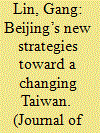

|
|
|
|
|
| Summary/Abstract |
Beijing’s new strategies toward Taiwan are informed by neo-functionalism derived from European experiences, assuming that economic integration will eventually lead to political accommodation and integration. Despite the surprising Sunflower Movement and the fiasco of the Chinese Nationalist Party (KMT) in the 2014 local elections, Beijing will try its best to maintain the momentum of peaceful development of cross-Strait relations. Facing a brand new Taiwan that seems an oddity to the mainland, however, Beijing has adapted to ‘the new normal’ with a slower pace, refocusing on the economic and cultural issues. Whether or to what degree Beijing will change its asymmetric engagements with the two main parties on the island, however, is contingent upon whether the KMT and the Democratic Progressive Party (DPP) can reach a balance of power domestically and whether their policies toward the mainland converge rather than diverge. At any rate, Beijing is likely to pay more attention to ordinary people’s feelings about cross-Strait economic and cultural exchanges and consider quality of cross-Strait exchange as more important than quantity of activities.
|
|
|
|
|
|
|
|
|
|
|
|
|
|
|
|
| 2 |
ID:
049221
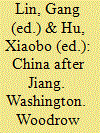

|
|
|
|
|
| Publication |
Washington, Woodrow Wilson Center Press, 2003.
|
| Description |
x, 161p.
|
| Standard Number |
0804749183
|
|
|
|
|
|
|
|
|
|
|
|
Copies: C:1/I:1,R:0,Q:0
Circulation
| Accession# | Call# | Current Location | Status | Policy | Location | IssuedTo | DueOn |
| 047234 | 320.951/LIN 047234 | Main | Issued | General | | RF153 | 13-Aug-2023 |
|
|
|
|
| 3 |
ID:
160781
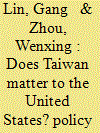

|
|
|
|
|
| Summary/Abstract |
This article approaches the puzzle of whether and to what degree Taiwan matters to the United States. The deteriorating of cross-Strait relations since 2016 has made people more concerned about the sustainability of the status quo. For the Chinese mainland, the danger is the possible collapse of U.S. one-China policy—a key pillar of the U.S.-China diplomatic architecture; for Taiwan, the nightmare is that the businessman-turned-president might sell out the island for economic gains from the mainland. Trump's aversion toward liberal institutionalism and his advocacy of economic nationalism have revived the specter of Taiwan abandonment, which have occurred occasionally in U.S. foreign policy thinking since the late 1940s. To be sure, "abandoning Taiwan" as well as the Cold War mind-set of playing wildly the "Taiwan card" are far from the mainstream view in U.S. policy circles today, which favors maintaining the status quo. Still, such heterodox arguments have made salient the fundamental issue of whether Taiwan is a strategic liability or a strategic asset for the United States. Which view prevails matters a great deal for the state of U.S.-China relations and whether that relationship will be more cooperative or confrontational in the years to come.
|
|
|
|
|
|
|
|
|
|
|
|
|
|
|
|
| 4 |
ID:
051990
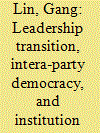

|
|
|
|
|
| Publication |
Mar-Apr 2004.
|
|
|
|
|
|
|
|
|
|
|
|
|
|
|
|
| 5 |
ID:
169884
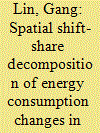

|
|
|
|
|
| Summary/Abstract |
The objective of this paper is to investigate the changes in the regional energy consumption at the provincial level in China from 2007 to 2016 by introducing a spatial shift-share decomposition approach to measure the neighborhood effect on the regional energy efficiency change through the establishment of a spatial weight matrix considering the geographical and economic proximity. Using this decomposition method, the regional advantage (or disadvantage) in energy efficiency can be revealed, excluding the influence of neighborhood performance in terms of energy efficiency. The results indicate that a shift from energy intensive industrial productions toward the less energy intensive service sector occurs in almost all provinces of China over the period observed; there is significant spatial differentiation on the spatial decomposition of the efficiency change component across provinces, and the changes in energy efficiency in provinces of Jing-Jin-Ji, Yangtze River Delta, Chengdu-Chongqing, Guanzhong Plain, Pan-Pearl River Delta city agglomeration and the three provinces in Northeast China are mainly affected by the neighborhood effect. Our empirical findings suggest that energy policy making should be more concerned about the spatial correlation and coupling effects of energy consumption, especially in the national urban agglomeration of China.
|
|
|
|
|
|
|
|
|
|
|
|
|
|
|
|
| 6 |
ID:
155226
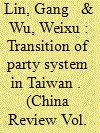

|
|
|
|
|
| Summary/Abstract |
This article attempts to explore the evolution of power structure of the two main parties in Taiwan and the possibility of transformation of party politics from divergence to convergence. Institutionally, the game of plurality voting system tends to marginalize the third party and encourage a balanced two-party system. It may also pull the two parties toward the central line amid increasing interparty competition. From the social perspective, however, the inherently different supporters of the two parties tend to pull the parties away from the direction of convergence. While KMT supporters are more caring about economic growth and a good relationship with the mainland, DPP supporters are more concerned about distributional justice and worried that close cross-strait relations may present a greater threat to the island, either politically or economically. These social cleavages have underscored different policy positions of the two parties. This article concludes that while the KMT and the DPP have reduced their difference in social and economic policies, they are still divided on the issue of how to deal with the Chinese mainland, namely, whether Taiwan should be attached to or detached from the mainland in the future.
|
|
|
|
|
|
|
|
|
|
|
|
|
|
|
|
| 7 |
ID:
160775
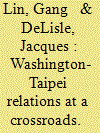

|
|
|
|
|
| Summary/Abstract |
Elections of new leaders in Taiwan and the United States in 2016—and, less dramatically, the 19th National Congress of the Chinese Communist Party (CCP) and the 2017 session of the National People's Congress in China—have changed the domestic landscapes that shape U.S.-Taiwan relations. The two elections brought to office leaders who are significantly different from their opposite party predecessors. In Taiwan, voters selected Tsai Ing-wen (蔡英文), the candidate of the traditionally pro-independence Democratic Progressive Party (DPP), which last held power during 2000–2008—a period of chronic tension and occasional crises in cross-Strait relations. In the United States, Donald Trump came to office with palpable disdain for Washington's established ways and with a foreign policy and national security policy team that was sparse, unconventional, and strikingly thin in experience and expertise in Taiwan and cross-Strait policies. The approach of the first Party Congress heldfully [End Page 1] under Xi Jinping's leadership had triggered much speculation about possible changes in cross-Strait policy although, in the end, adjustments were limited to a marginally tougher line toward Taiwan (as well as striking indications of Xi's consolidation of power), but no major changes in Beijing's approach to cross-Strait issues.
|
|
|
|
|
|
|
|
|
|
|
|
|
|
|
|
| 8 |
ID:
185969


|
|
|
|
|
| Summary/Abstract |
Through a quantitative analysis of Taiwan–related legislation between 1979 and 2020, the article finds that the degree of Taiwan–related legislation is significantly correlated with the degree of tension in U.S.—China relations. While a deteriorating cross–Taiwan Strait relationship is clearly associated with the increasing legislative activities for the sake of Taiwan, an improving relationship from the state of fair to good cannot guarantee a decrease of such activities. A unified government and the extent of the Taiwan lobby are both helpful in passing pro–Taiwan acts but statistically insignificant. A content analysis of pro–Taiwan bills approved by the Trump administration suggests a creeping movement to “normalize” U.S–Taiwan relations with congressional activism and the less-restrained White House as a co–engine.
|
|
|
|
|
|
|
|
|
|
|
|
|
|
|
|
|
|
|
|
|